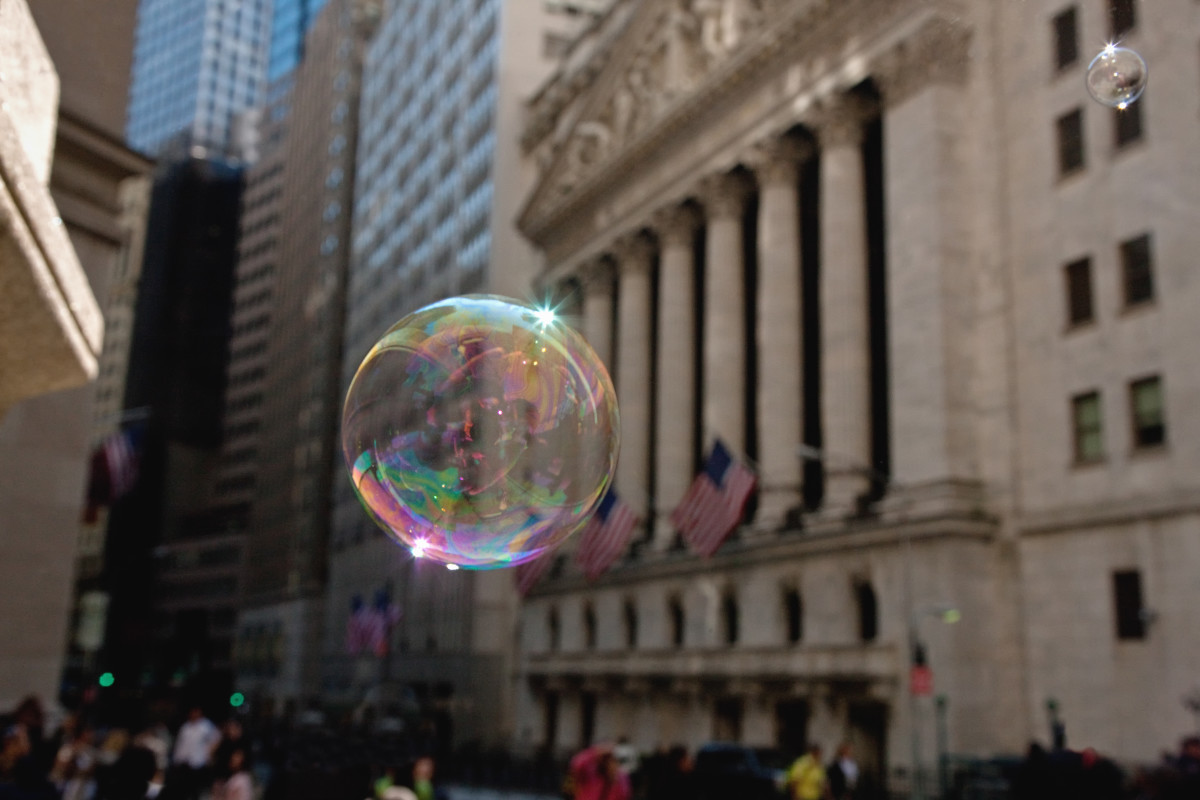
Fast Facts
- Deepwater management's Gene Munster thinks an AI bull market will rage for the next three to five years, before ending in a bubble.
- AI researcher Gary Marcus said that the AI bubble could burst within the next year.
- Venture capital firm Sequoia recently estimated that the AI industry spent $50 billion on Nvidia chips last year alone, making $3 billion in revenue.
In 2000, the dot-com bubble burst, ending a five-year period of soaring valuations and ever-increasing investor excitement over the many potential applications of the World Wide Web.
Baseless excitement sent a huge share of venture capital funding to internet startups between 1995 and 2000, simultaneously pushing the Nasdaq index up from under 1,000 to over 5,000.
Of course, by 2002, the index had fallen to 1,139, a nearly 80% drop.
The past year has seen the creation of an eerily similar boom, this time centered around artificial intelligence.
Related: Expert on government-commissioned AI threat report: A lot of hype, but a good plan
The AI Explosion
According to the Organization for Economic Cooperation and Development (OECD), venture capital investments in AI have been growing steadily since 2012, reaching $42 billion (a 57% share of the global total) in 2020.
In 2023, AI startups snagged a total of around $50 billion in venture capital investments, according to Crunchbase data, a significant share of the $285 billion in startup investments tracked around the world for the year.
Crunchbase recently found that a fifth of all venture capital funding ($4.7 billion) went to AI companies in February, an amount that was more than double last year's numbers.
This all comes as the tech has fueled enormous valuations across the industry — according to the Wall Street Journal, Perplixity is valued at $1 billion, Mistral is valued at $2 billion and Cognition Labs is now valued at $2 billion. Inflection is valued at around $4 billion, and Anthropic was last valued at $18.4 billion, according to CNBC.
And OpenAI, meanwhile, has a valuation of $80 billion.
That's not to mention the public companies (Nvidia (NVDA) and Microsoft (MSFT) , for example), that have witnessed enormous stock surges over the past year. In March of 2023, Nvidia had a market cap of under $700 billion. It is now valued at $2.25 trillion.
This time last year, Microsoft was valued at just above $2 trillion. As of Monday afternoon, it was valued at $3.14 trillion.
A recent presentation from venture capital firm Sequoia found that the AI industry in 2023 spent $50 billion on Nvidia chips alone, according to the Journal.
The industry at the same time brought in only $3 billion of revenue.
A recent white paper from PagerDuty additionally found that 100% of corporate executives who partook in its recent survey have security concerns related to AI; 98% have paused internal AI initiatives until these concerns are properly mitigated.
Related: Apple, Google and Meta are under investigation ... again
Marcus and Munster: The AI bubble
Deepwater Management's Gene Munster said Monday that "the chapter of AI value creation is just starting."
Munster believes "we’re in the early stages of a 3-5 year bull market that will end in a bubble."
The idea that the AI sector is moving toward a bubble is one shared by AI researcher and cognitive scientist Gary Marcus.
Marcus said in a recent post that the AI sector is currently facing three core problems: one, a software that costs a lot to develop but isn't generating returns to match, two, the software has deep security flaws, and three, hallucinations aren't going away, making that software unreliable for a bunch of use-cases.
"The entire industry is based on hype," he said.
To match the current valuations and hype, Marcus said that at least one company must identify a problem and ship a solution to that problem, all while charging plenty of money and giving customers plenty of confidence in the realms of reliability and security.
He doesn't expect it to happen.
"If nobody (OpenAI, Google, or anyone else) releases a true quantum leap by the end of 2024, substantially addressing key issues around reliability, hallucination, data leakage, and security, the bubble may start to pop by this time next year," Marcus said. "GenAI will still exist, and find some use, but valuations and excitement may dissipate, reemerging only once genuine advances are made."
Related: OpenAI board member has a scary prediction for the future of work
Contact Ian with tips and AI stories via email, ian.krietzberg@thearenagroup.net, or Signal 732-804-1223.







